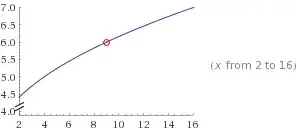I am very curious why $\frac{(x-9)}{{\sqrt x}-3}$ and ${\sqrt x}+3$ yields different values (or one is undefined while other gives $6$) at $x=9$ even they are equal. $$ \frac{x-9}{{\sqrt x}-3} = \frac{{({\sqrt x} + 3)({\sqrt x} - 3)}}{{\sqrt x}-3} = {\sqrt x}+3 $$ And some graph plotting websites give the same graph for both functions while google search gives different graphs for the two functions.
-
You cannot divide by $\sqrt x -3 $ when it is equal to zero. The first function is undefined for $x=9$. – John Doe Dec 03 '16 at 13:43
-
They're only equal given that $\sqrt{x}-3\neq0$ (which is why you can make the cancellation you have). A function has a domain and codomain as well as a rule, the domain of the first one cannot include $x=9$. – danwalkerdev Dec 03 '16 at 13:43
-
I knew why is it undefined, as I can't divide by zeros. I want to know is why do those give different values even they are equal – Rusiru Adithya Samarasinghe Dec 03 '16 at 13:46
3 Answers
Both functions $\dfrac{x-9}{{\sqrt{x}}-3}$ and ${\sqrt{x}}+3 $ agree over $[0,9)\cup (9,\infty)$, but the first one is not defined at $x=9$ whereas the the latter is.
- 120,989
-
-
1Stricto sensu those two functions are not equal, the domains are not the same. – Olivier Oloa Dec 03 '16 at 13:48
-
Thanks @Oliver Oloa. Please help me with this also. Then why do we simplify the first one towards next one when we calculate limits. I thought that limits are applied in functions. If they are different how do we say that the seconds one's limit is same of first one – Rusiru Adithya Samarasinghe Dec 03 '16 at 13:52
-
If this was given as a limit as $x\to 9$, then we'd have the determinant value of $\dfrac 00$. We can then to what you've done, to simplify and evaluate. But recall that the limit of $x \to 9, f(x) $ is not to be seen as simply evaluating $f(9)$. – amWhy Dec 03 '16 at 13:57
-
1@user3628865 This is a good question. You may notice that when we write $\lim_{x \to a}f(x)$ this always means $\lim_{x \to a, ,x \neq a}f(x)$. – Olivier Oloa Dec 03 '16 at 13:57
-
Since division by zero is undefined, your assertion that $$\frac{x - 9}{\sqrt{x} - 3} = \frac{(\sqrt{x} + 3)(\sqrt{x} - 3}{\sqrt{x} - 3} = \sqrt{x} + 3$$ is only true when $x \neq 9$. The function $$f(x) = \sqrt{x} + 3$$ has domain $[0, \infty)$, while the function $$g(x) = \frac{x - 9}{\sqrt{x} - 3}$$ has domain $[0, 9) \cup (9, \infty)$ since division by zero is undefined. Since the functions $f$ and $g$ have different domains, they are not the same even though they agree on the intersection of their domains. The graph of $f$ is continuous, while the graph of $g$ has a hole at the point $(9, 6)$. Therefore, the graphs of $f$ and $g$ are indeed different.
- 76,571
Apparently your question arises in the case of evaluating the limit:
$$\lim_{x\to 9} \frac {x-9}{\sqrt x - 3}.$$ Evaluating the function at $x=9$ yields an indeterminate form $\frac 00$, which does not mean the limit is undefined; what it tells us is that more work needs to be done, in order to understand the behavior of the function as $x$ becomes arbitrarily close to $9$, acknowledging $x \neq 9$.
So we factor out and cancel factors in this case, in order to evaluate the limit as $x\t 9,\;x\neq 9$. T
he cancelation is valid for all $x\neq 9$, so we can do this.
So in this sense, the initial limit is equivalent to $$\lim_{x\to 9} \sqrt x + 3 = 6$$
This is the graph wolfram alpha provides upon entry of $$\lim_{x\to 9} \frac {x-9}{\sqrt x - 3}:$$
- 209,954
-
Okay. I know I'm getting off the topic. Please tell me that doesn't that limit mean when x goes to 9 then y goes to 6? But in the google graph y goes to infinity and minus infinity at x=9 – Rusiru Adithya Samarasinghe Dec 03 '16 at 14:11
-
Did you ask google graph to evaluate the limit, or did you just graph the function? – amWhy Dec 03 '16 at 14:16
-
-
Well, I think there's a problem with what you entered, or else google spit out a complex-valued plot, and your range for x, y was too big. For real-valued plot of just the function, you should get (I just confirmed): link to function and graph – amWhy Dec 03 '16 at 14:28
-
